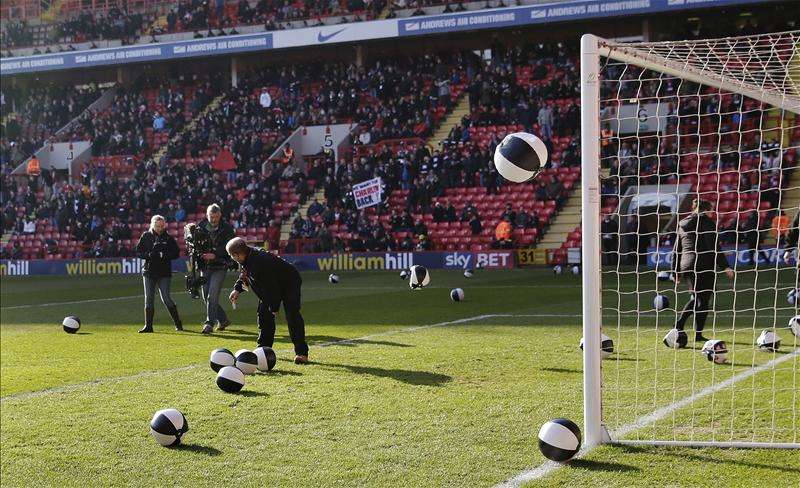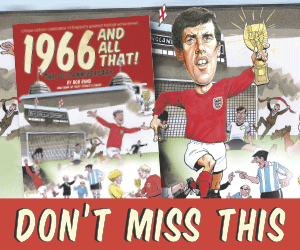
By Ross Keen
It was the darkest November night and the coldest anyone has ever been. I was 6 years old and as me, my Dad and my Grandad walked the seemingly never ending walk down through Charlton Park to The Valley the excitement built.
High off the recent summer of Euro ’96, the weeks and weeks of persistent pestering had paid off as I was finally invited to see my local team, Charlton Athletic.
I don’t recall much of the evening’s football – I have no idea of the result and it largely doesn’t matter; but I can vividly picture the bright colours on show dazzling under the Valley floodlights, the contrasting purest green pitch and the bold brave red shirts as the home side played an exotic Grimsby side (which I now know probably featured my future hero Clive Mendonca).
The temporary warmth offered by the crowd, fuelled by an innocent and old fashioned passion and optimism, has remained with me ever since; and I remember returning home with a smile and seeing my breath in the freezing night sky after an evening that everyone had enjoyed.
And it’s a similar story with the hundreds and hundreds of subsequent Valley games witnessed since; a season ticket holder since 2003/04 – when Charlton had arguably their strongest team of the modern era – my main match day memories do not solely comprise goals, players or results. Players have increasingly come and gone and almost all largely been forgotten over time – from stalwarts like Graham Stuart to nonentities like Cory Gibbs – but the match day experience itself and the associated joys have stayed the same and, despite a decade of relegation and relative mediocrity, so has the enjoyment factor.
The quality of football, the level of play or the excitement of a season is by and large irrelevant once you are devoted; a three-year stay in League One between 2009 and 2012 still yielded an average attendance for Charlton of around 17,000. The rapid decline of Premier League to third tier in just three years was not enough to kill the Charlton support, which still comprised families and friends, and generations of fans; each supporter’s habitual ritual a sacred and unique experience as they went Into The Valley; betrothed and divine.
Typically, this goes for all football fans – no matter who they support or how they support them; why else would Portsmouth fans bother?
However, now at Charlton, with the dissatisfaction at the unparalleled mismanagement and the ongoing dismantling of the football club at its peak – robbed off its culture by a despot and ignorant owner in the Belgian Roland Duchatelet – Addicks fans are on the brink.
Supporter unrest is dangerously high and a breakaway fans’ group (‘CARD’ or Charlton Against Roland Duchatelet) are attempting to encourage supporters to not renew season tickets, as well as promoting disruption.
Since buying Charlton in 2014, Duchatelet has ripped the soul from this once proud club.
Intentionally or not, the Belgian and his boardroom accomplices’ naivety of English football – failure to display a core understanding of the qualities required by staff and players for the team to survive and prosper – has been shown up time and time again; and in doing so making the club a farce and disrespecting the paying fans.
Charlton were relegated to League One at a at a time when going down was more critical than ever before to the club’s survival; particularly given the relocation of West Ham to the Olympic Stadium and the apparent apathy around The Valley.
There is an argument that, objectively speaking, Duchatelet has invested in the club. And on the face of it, it can be said that the Belgian, an obviously shrewd businessman, must see the clear potential in Charlton Athletic (in terms of location, existing fan base and infrastructure) that would have attracted him to the club in the first place.
A reported £8m has been invested in the playing squad in his time and further investment has been made with the development of the training ground and renovation of The Valley pitch and match day facilities.
Duchatelet’s most serious crime, however, is far more terminal than those that are purely football related.
Fuelled by his own stubborn ignorance, there has been a severe failure to recognise that a sustainable football club is a focal point of the community; in which thousands of people’s hopes and dreams, passion and identity are invested and reside within – often even their very purpose and their personal pride.
The fact that Charlton’s CEO, Katrien Meire, has implicitly referred to fans as ‘customers’ perfectly demonstrates this failure to comprehend the British football fan’s psyche.
Sadly, this story is an increasingly common tale. Owners are dismantling clubs across the country and across the leagues, with the likes of Leeds United, Hull City, Blackpool and Cardiff all similarly affected to name a few.
Football is being brought into disrepute by the damages certain owners are causing and the distress they inflict, intentionally or not, on supporters.
In 2016 it is a grim yet accepted reality that a football club is also a business. But surely there has to be a compromise whereby a club’s fans and heritage are not sold out at the expense of profit or vision? But is there any protection afforded to fans at present?
Sometimes clubs get into such a financial mess that there is an opportunity for the fans to take over, like at Portsmouth or Wrexham.
But this doesn’t happen very often and supporters usually can’t afford to buy their club.
The current favoured fans’ response to mismanagement is to protest; but the result of this tactic is generally constrained to either minor financial losses (perhaps via declines in attendance or merchandise sales) or reputational embarrassment to the owners – neither of which are likely to force a departure.
This leaves supporters facing the uncomfortable truth that once an owner is in control of a club, they will most likely only go once an opportunity to sell up on their own specific terms at a time that suits them presents itself.
It is vital, therefore, that the gap between supporters and owners – the lack of accountability currently being experienced – is bridged urgently so that all parties can work together to see their club, which they are both invested in for entirely different reasons, succeed.
The FA Fit and Proper Person regulation – enforced at Football League level by the Football League in the form of the ‘Owners and Directors Test’ – is designed specifically to ensure that anyone who takes a 30 per cent interest in a club is assessed for competency; this is in order to ‘protect the image and integrity of the League and its competitions, the well-being of clubs and the interests of all stakeholders in those clubs…’
In theory, this should work to protect fans’ interests as owners (or ‘Relevant Persons’) are potentially prevented from running a club should they be found to meet a ‘disqualifying event’ – however, the disqualifying events are centred primarily on financial management issues (the recent and high-profile example being the suspension of Leeds United owner Massimo Cellino on the grounds of being found guilty of tax evasion).
Little is really known by football fans as to the ins and outs of the daily fiscal management of their respective clubs; in truth fans can only speculate on how the club is run financially speaking.
But the fans know more than anyone about whether the culture of a club is being mismanaged – be it in the form of a proposed club name change or altering the team colours, to the recruitment of inexperienced mercenary playing staff.
It is painfully clear that the extent of the Fit and Proper regulation does not go far enough to protect supporters. However, its inherent purpose could provide the vehicle in which to offer accountability of owners actions to fans.
Perhaps inspiration should be sought from the continent. The German second division side FC St Pauli of Hamburg have, since 2009, operated by a set of ‘Fundamental Principles’ – in effect a supporters’ charter aimed at securing and protecting supporters’ interest in their club as a community centre point. The scope of the principles go beyond mere football and range from preserving social responsibility to acknowledging the identity of a club as being something that the club are responsible to the fans for.
There is a strong opportunity that the creation of ‘Supporters’ Charters’ – bespoke to individual clubs and comprising a reasonable short and concise set of requirements drawn up and agreed by fans relevant to their respective concerns and ambitions – could be integrated into a football club’s management as a dogma for which owners, both existing and future, must within reason honour and adopt so as to protect the heritage and culture of the clubs as community assets and preserve links with fans.
There are, of course, issues with this approach in terms of its potential application; namely the need for an inclusive process by which a charter is drafted, ensuring the legitimacy and practicality of anything contained within it, and thereafter the subsequent enforcement of its contents.
However, all of these prospective issues could be mitigated via the formal supervision and adoption of such a scheme by the FA, and subsequent recognition of supporters’ rights within the Fit and Proper regulation.
Support of the game is at a crossroads; recent seasons have seen increasing supporter unrest as the gaps between clubs and fans grow further.
Something has to give urgently to repair this crucial relationship if football is to survive into the future. Supporters Charters’ may just be the answer.

















